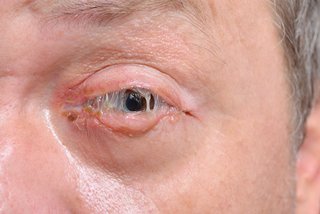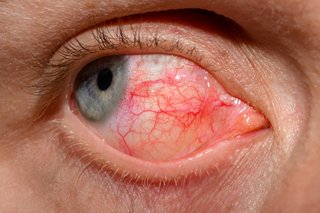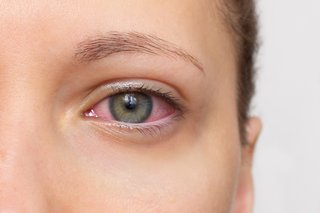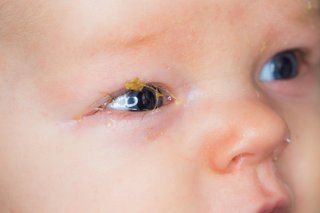Conjunctivitis (red or pink eye) is an eye condition caused by infection or allergies. Some sexually transmitted infections (STIs) can cause conjunctivitis.
You can usually treat it at home if you're an adult. But your child might need to go to a GP, pharmacist or have urgent treatment.
Emergency action required: Ask for an urgent GP appointment or go to the emergency department if
- your child has conjunctivitis and is less than 4 weeks old
If your child has conjunctivitis
Symptoms of conjunctivitis
Conjunctivitis usually makes your eyes:
- bloodshot
- itchy, gritty or sore
- produce pus that sticks to your lashes
- swollen
- water
You or your child might also have flu-like symptoms.
Check if your conjunctivitis is contagious
Conjunctivitis can be contagious.
When it is caused by allergies like hay fever, conjunctivitis can make the eyes red and watery but it is not contagious.



Emergency action required: Ask for an urgent GP appointment or go to the emergency department if
you have conjunctivitis and:
- pain in your eyes
- changes in your vision, like wavy lines or flashing
- intense redness in one or both eyes
These can be signs of a more serious eye problem.
Non-urgent advice: Contact your GP or optician if
you have conjunctivitis and:
- you wear contact lenses, have symptoms and spots on your eyelids - you might be allergic to the lenses
- your symptoms have not cleared up after 2 weeks
If your child has conjunctivitis
If you think your baby has conjunctivitis and they are:
- less than 6 months old, take them to your GP
- over 6 months old, take them to your GP or pharmacist

Emergency action required: Ask for an urgent GP appointment or go to the emergency department if
your child has symptoms and:
- is less than 4 weeks old
- is in severe pain
- has blurry vision, even after you've cleaned their eyes
- might have something in their eye, such as sand or grit
- has a rash - your child could have an infection like measles
- wears contact lenses
- feels more pain when looking at light (photophobia)
Non-urgent advice: Contact your GP if your child:
- has 1 or 2 red eyes for more than 2 days
- has painful or uncomfortable eyes for more than 2 days
- is distressed by conjunctivitis symptoms
- has sticky eyes for 2 weeks or more
Conjunctivitis can sometimes be diagnosed and treated by a pharmacist through the Common Conditions Service. There is a fee for this service.
Treatment from a GP or pharmacist
Treatment for conjunctivitis depends on the cause. Antibiotics do not work on conjunctivitis caused by a virus or an allergy.
If it is a bacterial infection, you may need antibiotic eye drops. You can get these on prescription from your GP or pharmacist.
You can buy antihistamine eye drops for an allergy from a pharmacy. Some of these are only available on prescription. Your GP or pharmacist can provide a prescription for these.
They will tell you how to ease the symptoms at home if you have conjunctivitis caused by a virus.
Treating conjunctivitis at home
There are things you can do to help ease your symptoms.
- Wash your hands.
- Boil water and let it cool down completely.
- Wet a clean cotton wool pad in the cooled water.
- Gently wipe your eye from the inner to the outer corner of your eye.
- Repeat this for your other eye - use a new cotton wool pad for each eye.
You can also hold a clean, cold flannel on your eyes for a few minutes to cool them down
Do not wear contact lenses until your eyes are better.
Using breast milk to treat your child's conjunctivitis
There is no evidence that putting breast milk in your baby's eyes clears conjunctivitis. But it is unlikely to cause harm.
Never put formula milk into your baby's eyes.
Stop contagious conjunctivitis spreading
There are things you can do to stop conjunctivitis spreading to other people.
Do
-
wash your or your child's hands often with warm soapy water
-
wash your child's hands immediately if they touch their eyes
-
tell your child not to touch or rub their eyes
-
wash pillows and face cloths in hot water and detergent
Don't
-
do not share towels and pillows
-
do not rub your eyes
Staying away from work or school
You do not need to stay away from work or school unless you or your child feel very unwell.
If your child has conjunctivitis, check that your childcare provider can look after your child.
Content supplied by the NHS and adapted for Ireland by the HSE
